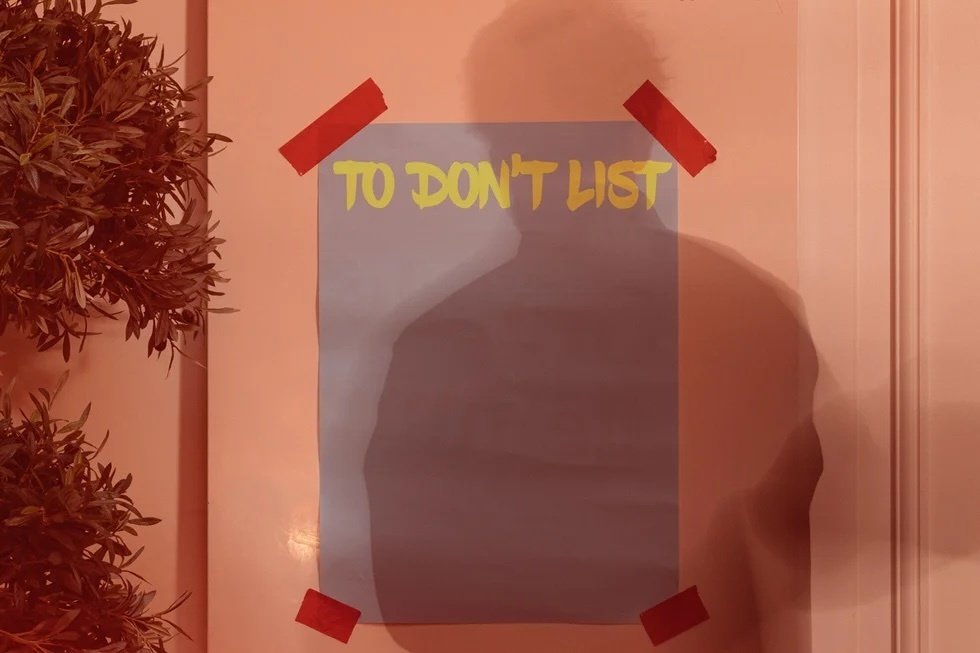Nailing your job search: Writing a to-don’t list for success
Jan 18, 2024
4 mins


Journaliste independante.
Knowing what you want at work isn’t always easy. Just like when you graduate high school and you’re clueless about picking a major or what you really want to do, career choices can be confusing and leave you feeling lost, even when you’re well into your working life. You may be ready for something new, but you have no idea what that new role looks like. If you’re feeling directionless, why not create a to-don’t list? It can act as the first step to finding a new, more suitable role. All you have to do is use a process of elimination to figure out the sort of things that make you want to run a mile.
In the 16th century, Greek, Christian author Pseudo-Denys the Areopagite created negative theology. He suggested that, as it was impossible to define what God is, we could describe him through what he is not. Outside of religion, this concept is known as Via Negativa. It’s all about focusing on making tangible actions using what they call subtractive knowledge. A to-don’t list is a sort of modern twist on this Greek theory: it’s a bullet-pointed list of all the things you’ve seen, experienced, or come across, that you no longer want in your life.
Negative interest
Unlike a to-do list, where you aim to cross points off over time as you complete them, the to-don’t list is a permanent fixture. This ‘what not to do’ list isn’t designed to organize and optimize your daily life. Instead, it’s something you keep to remind yourself of your limits and the things you find more annoying than satisfying. When it comes to your job search, the items on this list can refer to different aspects of a role: working hours, company size, ethics, salary, hierarchy, etc. Making a note of the negatives can have a mirror effect and highlight the kind of job that best meets your expectations.
Ex-executive assistant Penelope* left her role in a large company to do something that gave her more joy, and more importantly, less stress. Although she didn’t set out with a fixed idea of what to do next, her years of experience helped her focus her expectations: “In my previous role I was depressed. I was signed off sick for several months. I’d had enough of large companies with their complicated processes where. despite taking things over with HR, there were never any changes.” Although she didn’t create an actual bullet list, Penelope explored different activities, while keeping in mind the things that had made her quit her last job. This time round, she didn’t want to work for a multinational, she didn’t want a job where she had to be in the office all the time, nor any complicated, impossible-to-understand processes. So she started a freelance project using her writing skills—a far cry from the business world she was used to and radically different from her old daily life, which was made up of Excel files, meetings, and sweating in front of her screen.
Writing your to-don’t list
Want to work out the things you’d prefer to avoid in your career? Here’s how to create your to-don’t list.
1. Analyze your past experiences
To create a to-don’t list, you need a little hindsight and some inner work. According to career coach and consultant, Mila Elhamdi, for that you need experience. “Knowing what you don’t want means getting out there and trying things. You can’t just stick with what you know—you have to be open-minded about the world of work.” Only experience will tell you which situations, tasks, and conditions aren’t for you. Humans are particularly good at finding the negatives—like when you watch a crappy film on Netflix and love pointing out all the annoying things about it—so writing a list of negatives for your career shouldn’t be too hard. It’s not about roasting your manager or colleagues, it’s about highlighting difficult situations and things that have made you uncomfortable.
2. Don’t forget the positive
To-do and to-don’t lists are two completely different tools. They have different goals and can complement one another nicely. A traditional to-do list is generally used to list and organize tasks. When you’re looking for a job, you could use it to list the things you hope to find in your future role. It might be the industry you want to work in, that you want your job to mean something, or you want to use a specific skill set, it might even be that you want a canteen that serves fries at lunch … When placed side by side, these two lists can be a helpful guide during your job search.
3. Take action towards your resolutions
Making a list of resolutions is great, but taking them into consideration for your job search is better. Once you’ve listed the elements you want to avoid in priority order, adapt your search criteria, and your resume. “If you use the same resume you used to get a role that didn’t fully satisfy you, you’ll probably end up finding something similar. To create real change, you need to alter your resume to target the roles and keywords that interest you,” continues Elhamdi. It’s not worth wasting your energy applying for or working in a role that will end up being bad for you.
4. Be flexible
Your to-don’t list shouldn’t be so rigid that it becomes restrictive. If you find one of your negative criteria right in the middle of a job that looks really tempting, why not discuss your apprehension with the recruiter? Explain what puts you off about that part of the job description—they might be able to make certain adjustments to the role. Elhamdi explains, “A job description is an active document. You might be able to negotiate certain points in an interview the same way you can negotiate working conditions.” If a foreign language is required, and yours isn’t quite up to scratch, why not refresh with some classes? The same goes for remote work: if you need or want to spend a few days a week working from home, that’s something you can discuss at the interview.
If you think a to-don’t list is about seeing the glass as half empty, then you’d be wrong. Looking at the negatives and analyzing past experiences can help you set off in the right direction. A list of things you don’t want in your career can serve as a guide when you’re updating your resume, deciding to apply for jobs, or preparing for a job interview. It will help to stop you from repeating the same mistakes. Self-awareness and knowing what you don’t want aren’t just useful when you feel lost: keeping the key points in mind can also help you negotiate better and make more enlightened choices throughout your career.
Translated by Debbie Garrick
Photo: Welcome to the Jungle
Follow Welcome to the Jungle on Facebook, LinkedIn, and Instagram, and subscribe to our newsletter to get our latest articles every week!

More inspiration: Applying for jobs

Should you job hunt over the holidays? Tips to beat the new year rush
Searching for a new job to start fresh in 2025? The holiday season might be the right time for you to start the process.
Dec 09, 2024

Introverts & extroverts: Strategies to ace your interview
Job interviews can be tough, whether you're a social butterfly or a quieter introvert. The key to standing out is being yourself.
Aug 20, 2024

Should you be scared of the ghost job trend?
Have you ever been ignored after applying for a job? You may be a victim of the ghost job trend.
Jun 12, 2024

Lost in translation: Decoding bizarre job descriptions
“Candidates with no sense of humor need not apply.” Um …
Jan 25, 2024

Maximizing your references: Turning recommendations into opportunities
No more asking friends for fake references. Here’s how to get it right and land the job!
Dec 19, 2023
The newsletter that does the job
Want to keep up with the latest articles? Twice a week you can receive stories, jobs, and tips in your inbox.

Looking for your next job?
Over 200,000 people have found a job with Welcome to the Jungle.
Explore jobs